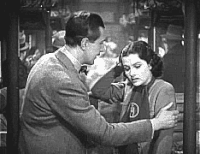|
|
Post by topbilled on Jan 27, 2024 17:59:43 GMT
It's always a bit tricky when a director blurs the line between tragedy and comedy...but some tragicomic films have done well with audiences over the years.
I would say Chaplin's THE KID (1921) is a good example of a story that contains much anguish, but also finds time to add in a few lighter touches.
Woody Allen's INTERIORS (1978) which I have always admired, will occasionally step away from the melodrama surrounding Geraldine Page's character so we can see a few humorous moments in the extended family.

|
|
|
|
Post by I Love Melvin on Jan 28, 2024 14:08:55 GMT
It's not tragi-comedy, but Hitchcock loved to blend drama and comedy. His comedic touches were a great way to keep the audience from od'ing on the action and suspense. He often combined it with a romantic subplot, so that was a further distraction until he wanted to slam the audience with the suspense again after he'd lulled them a bit. I'm particularly thinking of The 39 Steps (1935) when Robert Donat and Madeline Carroll were stranded overnight at the inn handcuffed together and all the comic gyrations they had to go through. Robert Cummings and Pricilla Lane had a similar dynamic in Saboteur (1942) as they were also on the run together. And North by Northwest (1959) is famous for its witty banter and romantic byplay. He also liked to use key supporting characters to punch up a comic undertone, like Florence Bates in Rebecca (1940) and Thelma Ritter and Jessie Royce Landis in later films (and that ornithologist in The Birds!). And it was no accident that one of his favorite actors to use, Cary Grant, was very skilled at comedy, subtle and otherwise.  |
|
|
|
Post by Fading Fast on Jan 28, 2024 14:57:06 GMT
It's not tragi-comedy, but Hitchcock loved to blend drama and comedy. His comedic touches were a great way to keep the audience from od'ing on the action and suspense. He often combined it with a romantic subplot, so that was a further distraction until he wanted to slam the audience with the suspense again after he'd lulled them a bit. I'm particularly thinking of The 39 Steps (1935) when Robert Donat and Madeline Carroll were stranded overnight at the inn handcuffed together and all the comic gyrations they had to go through. Robert Cummings and Pricilla Lane had a similar dynamic in Saboteur (1942) as they were also on the run together. And North by Northwest (1959) is famous for its witty banter and romantic byplay. He also liked to use key supporting characters to punch up a comic undertone, like Florence Bates in Rebecca (1940) and Thelma Ritter and Jessie Royce Landis in later films (and that ornithologist in The Birds!). And it was no accident that one of his favorite actors to use, Cary Grant, was very skilled at comedy, subtle and otherwise.     |
|
|
|
Post by I Love Melvin on Jan 28, 2024 15:35:32 GMT
Robert Altman wasn't to everyone's taste, but he was another who liked to sprinkle comic touches throughout essentially dramatic films, almost to the point of being black comedy. I'm thinking particularly of Nashville (1975), which was essentially about how the country music industry aligned itself around a presidential candidacy, with ancillary individual stories, such as a female country singer with debilitating emotional problems who is being stalked by a potential killer. One particularly comic subplot involved Geraldine Chaplin as BBC reporter Opal who was supposed to be capturing the "essence" of Nashville but kept being sidetracked into inconsequential reveries, such as pondering the significance of yellow as she wanders among the city's school busses. ('Do the children have yellow nightmares?") Hysterical, at least to me.  The idea of black comedy also just suggested Something for Everyone (1970), about a stranger (Michael York) with a fascination for castles who insinuates himself, by means including homicide, into the household of a formerly prominent but now impoverished family (with a castle) by using his sexual wiles on all of them, female and male. Angela Lansbury as the matriarch is the first target, then come the son and daughter, but the daughter is able to finally turn the tables on him. There are laughs, but they kind of catch in your throat too.  |
|